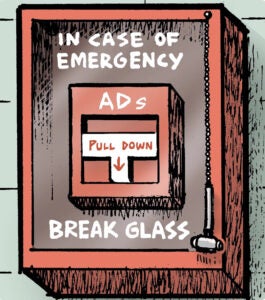Wonderland
Did you ever read Lewis Carroll’s “Through the Looking Glass,” the sequel to “Alice In Wonderland,” which documents a nightmare the human protagonist must escape?
Well, the online ad industry may soon have a similar experience, as it stands on the precipice of a new age in data-driven advertising.
Or maybe we’re reading too much into the fact that the IAB Tech Lab named its annual summit “Through the Looking Glass” this year.
Nah, it’s not that deep, one IAB Tech Lab employee told AdExchanger at the show, which was held in New York City this week. The event is more about the opportunity for agentic AI tech as well as other innovations that are reinventing the programmatic ecosystem.
One such non-AI breakthrough – yes, they do exist – is the Tech Lab’s new Ad Format Hero initiative, which aims to coalesce the industry around the CTV formats that advertisers want.
Apparently, there are more than 100 CTV ad format types flying around out there, per the Tech Lab’s announcement. This initiative should centralize and standardize that crowd into some single-digit number of winners (the “heroes,” if you will).
Guess all heroes don’t wear capes.
A(I)mbivalent
We’re watching AI take control of the digital advertising landscape, as Meta CEO Mark Zuckerberg announces plans to fully automate its ad platform by the end of 2026. Whether this is the edge of glory or something much more ominous remains to be seen.
In his new blog post, “Meditations in an emergency,” Eric Seufert discusses the effects of AI adoption on marketing. He considers a range of perspectives, from (over)zealous advertisers who view AI as an “immediate imperative” to anxious employees who are concerned about being replaced.
Neither necessarily comes out on top.
As the lines delineating audience segments blur together, “measurement becomes more of a challenge,” Seufert said, “creating the need for better and more sophisticated attribution modeling and incrementality analysis.” That’s one point for humans.
On the other hand, there is such a thing as too much of a (potentially) good thing. Incorporating AI into every part of digital advertising, he said, “could very well represent an extinction event for many agencies.” That’s one point for AI.
Where It’s Made
President Trump’s tariffs prompted brands to hype their “Made in America” bona fides. They’ve also triggered an uptick in lawsuits disputing those “Made in America” claims, The Wall Street Journal reports.
So far this year, 13 class-action lawsuits have been filed over products claiming to be made in the USA. That’s the largest number of such cases filed since 2011, according to Truth in Advertising. Last year, only seven such lawsuits were filed.
Defendants include cookware brand Nordic Ware, beverage brand R.C. Bigelow, Goya Foods, Procter & Gamble’s hair care brand Mielle Organics, PepsiCo and Unilever’s Pure Leaf Teas, McCormick and Co., and Dude Wipes.
As it turns out, 10 out of 13 of this year’s lawsuits were brought by one California-based law firm that saw opportunity in brands leaning into misleading “Made in America” marketing: Kazerouni Law Group. These cases have proven lucrative for Kazerouni. Its lone “Made in America” suit last year, filed against hair care brand Olaplex, could net the firm $1.05 million of a $1.35 million settlement.
The lawsuits do seem to have the intended effect of making brands be more honest about their manufacturing, though. For example, Dude Wipes is confident its case will be dismissed because it’s changed its labeling to “Assembled in the USA.”
But Wait! There’s More
An in-depth guide to Apple search ads. [Search Engine Journal]
Inside the ANA’s 72-hour B2B AI ad-athon. [The Drum]
A federal judge has barred Florida from enforcing its social media ban for children under the age of 14. [Fortune]
Google’s threat intelligence group warns of a new hacker effort to steal Salesforce data from companies by impersonating IT staff. [Bloomberg]
Newsweek acquires health care ad platform Adprime. [release]
Using interest-based advertising data for AI models? The Digital Advertising Alliance is developing guidance for industry use. [release]
The Washington Post is developing an AI tool that will supposedly help outside writers submit their column pitches. [The Verge]
A judge has denied Disney’s request for a temporary restraining order against its former executive Justin Connolly, who recently joined YouTube as its head of sports and who Disney feels will give YouTube a competitive advantage in the two companies’ negotiations over sports distribution rights. [Awful Announcing]
Thanks for reading AdExchanger’s daily news round-up… Want it by email? Sign up here.
















